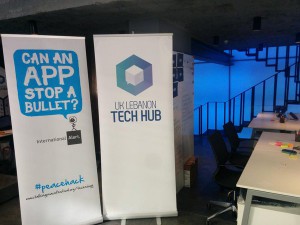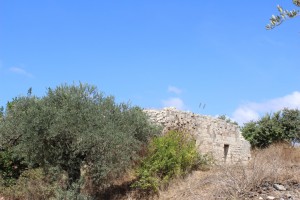9th November 2015 London, UK
#PeaceHackBey
As I clambered over a pile of stones atop a scrubby hillside olive grove in the searing midday Lebanese sun surveying the remains of the home of Lady Hestor Stanhope trying to recall how a degree in archaeology and passion for this kind of outdoor exploration and activity had lead me to working in the hallowed corridors of King Charles Street for the Foreign Office I was struck by the longevity and power of the relationship between the UK and the Lebanon through the past 200 years and the key role women have played in that relationship. As these thoughts filtered through my head I realized what a privilege it was to be in the country as a mentor and judge at the first Lebanese hackathon being held in the UK Lebanon Techhub in Beirut.
#PeaceHackBey was one of five hackathons* being organized by International Alert as part of their “Can an App Stop a Bullet ”initiative to encourage innovation in the use of technology to solve practical problems and issues faced in war zones by refugees, victims of war or persecution. Still rebuilding after its civil war and more recent conflicts in the past 2 years Lebanon has seen its population grow by more than one million through the influx of refugees from Syria. In addition the Lebanese technology sector is growing and to support it and build links between with the UK industry we have sponsored the UK Lebanon Tech Hub – a fully equipped building for startups and enterprises to share UK expertise in supporting entrepreneurship and Small-Medium Enterprises in Lebanon with a view to increase GDP and create jobs in the country. It is also a perfect venue to run a hackathon.
Following on from the EndSVChack we ran as part of the Global Summit to stop Sexual Violence in conflict in 2013 the hack was run by Chayn. The objectives were to come up with an app to support refugees, women or youth access services in a weekend. With over 80 individuals of a range of ages and backgrounds at the Friday evening opening event with HMA Hugo Shorter, 180 initial ideas and two offered prizes of seed funding and start up mentoring form two of the most influential Lebanese technology companies this pioneering event had hit on an untapped demand. By the end of the weekend 10 teams had built a range of prototypes they pitched to a panel of 8 judges drawn from various NGO’s, Tech experts, journalist and diplomats.
All of the entries were inspiring and ranged from creating a platform to support people learning Arabic, to secure cloud storage app to allow refugees to access validated copies of their identity documents the can access from anywhere in the world or a portal to connect volunteers to civic projects they have the skills or desire to work on. My particular favorite was the platform to enable citizens to report issues with their public services (such as uncollected refuse which has been particularly contentious in Beirut recently) which was also looking to try to harness the Lebanese open data movement. The winners were StepForward – a platform to enable people making donations of clothes, technology or similar to refugees to navigate which NGO would take what type of items and M3SH which used new mesh technology to build peer to peer wiki accessible on mobile phones specifically for use in refugee camps where internet connectivity and data are limited and information sharing and transmission is difficult.

These two winning teams will now be provided with seed funding and taken through an accelerator startup process with the aim that they will become fully developed and deployed products. Proof once more that given the space and support to be creative people can come up with innovative solutions to real life problems and whilst we have long way to go to fully realize the potential of technology to meet some of these challenges I am really pleased that the links between UK and Lebanon mean the FCO is at the forefront of making that happen.
* A hackathon is a gathering of people (with different skills from diverse backgrounds for a defined time) using technology to transform ideas into reality. Participants can be organized into teams which can be supported in the development process by experts in the subject. At the end of the event, participants present the first prototypes of an idea to a panel of judges in a bid to earn prizes.
